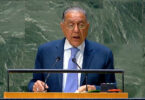BEIJING (Reuters) : China’s former Premier Li Keqiang died of a heart attack on Friday, just 10 months after retiring from a decade in office during which his reformist star had dimmed. He was 68.
Once viewed as a top Communist Party leadership contender, Li was sidelined in recent years by President Xi Jinping, who tightened his grip on power and steered the world’s second-largest economy in a more statist direction.
The elite economist was seen as a supporter of a more liberal market economy but had to bend to Xi’s preference for more state control.
“Comrade Li Keqiang, while resting in Shanghai in recent days, experienced a sudden heart attack on Oct. 26 and after all-out efforts to revive him failed, died in Shanghai at ten minutes past midnight on Oct. 27,” state broadcaster CCTV reported. An obituary will be published later, it said.
Li was premier and head of China’s cabinet under Xi for a decade until stepping down in March.
“No matter how the international winds and clouds change, China will unswervingly expand its opening up.” Li said at his last public appearance in a press conference in March. “The Yangtze River and the Yellow River will not flow backwards.”
He sparked debate on poverty and income inequality in 2020, saying 600 million people in China earned less than the equivalent of $140 per month.
Adam Ni, an independent China political analyst and author, described Li as “a premier who stood powerless as China took a sharp turn away from reform and opening”.
Li was born in Anhui province in eastern China, a poor farming area where his father was an official and where he was sent to toil in the fields during the Cultural Revolution.
While studying law at the prestigious Peking University, Li befriended ardent pro-democracy advocates, some of whom would become outright challengers to party control.
The confident English speaker was immersed in the intellectual and political ferment of the decade of reform under then-paramount leader Deng Xiaoping. That period ended in the 1989 pro-democracy Tiananmen Square protests that the military crushed.
After graduation, he joined the Communist Party’s Youth League, then a reformist-tinged ladder to higher office.
He rose in the Youth League while completing a master’s degree in law and then an economics doctorate under Professor Li Yining, a well-known advocate of market reforms.
His political experience as a provincial leader in Henan, a poor and restless rural belt of central China, was marred by accusation of cracking down after an AIDS scandal. He also served as party chief of Liaoning, a rustbelt province striving to attract investment and reinvent itself as a modern industrial heartland.
Li’s patron was Hu Jintao, a former president from a political faction loosely based around the Youth League.
After Xi took over as party chief in 2012, he took steps to break up the Youth League faction.







